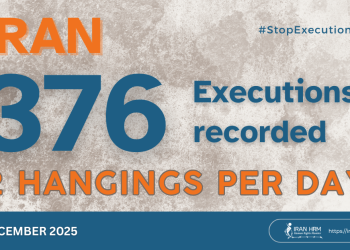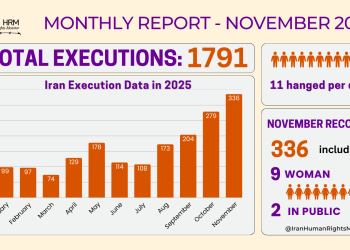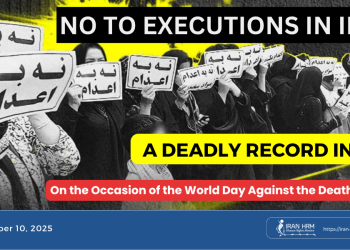October 2025 saw an unprecedented escalation in executions across Iran, alongside intensified pressure on political prisoners, systemic medical neglect, and nationwide prison protests against the death penalty. Documented executions reached at least 279 for the month of October—an historic monthly high in recent decades—bringing the recorded total to 1,455 in the first ten months of 2025. The month included executions of 8 women and juvenile offenders, public hangings, and seven political prisoners executed on 4 October in Ahvaz and Karaj. Families of death-row prisoners repeatedly protested in Tehran, while about 1,500 death-row prisoners in Qezel Hesar Prison undertook a multi-day hunger strike demanding an end to executions.
Key figures (October 2025)
At least 279 executions in October, with the pace reaching ~one every 2–3 hours.
Among the 279, authorities executed 8 women and one juvenile offender who was under 18 at the time of the alleged crime.
Patterns and methods
Mass and serial executions occurred in clusters across multiple prisons (e.g., Qezel Hesar, Shiraz, Isfahan, Mashhad, Kerman, Qom, Rasht, Zanjan), with single-day tallies repeatedly reaching double digits (e.g., 24 executed on 15 Oct; 18 on 8 Oct; 15 on 22 Oct).
Drug-related charges remained a major driver, while authorities simultaneously executed political prisoners on security-related charges.
Due-process deficiencies persisted: abbreviated trials, video-conference hearings, denial of chosen counsel, and Supreme Court approvals despite alleged serious procedural flaws.
Notable incidents and cases
Executions of seven political prisoners on 4 October
Six Ahvazi Arab political prisoners executed in Sepidar Prison (Ahvaz):
Ali Mojadam (44), Seyed Salem Mousavi (41), Seyed Adnan Ghobeishavi (29), Moein Khanfari (31), Habib Deris (42), Mohammadreza Moghadam (33).
The six men endured years of interrogation and torture. They were sentenced to death on 14 February 2023 by Branch 4 of the Ahvaz Revolutionary Court, presided over by judge Adibi.
Saman Mohammadi-Khiareh executed in Qezel Hesar (Karaj):
The judiciary claimed he was executed for “armed operations, planning, and leading the assassination of Mamousta Mohammad Sheikh-al-Islam (17 Sep 2009, Sanandaj).”
Supreme Court approvals of death sentences
Ehsan Faridi (22), student; supporter of the People’s Mojahedin Organization of Iran (PMOI/MEK)
Initial verdict: Death sentence by Branch 3 of Tabriz Revolutionary Court (Judge Hassan Fathpour) in May 2025, on “corruption on earth” tied to support for the PMOI. Arrested: 18 June 2024.
Supreme Court: Approval announced by his lawyer on 8 Oct 2025. A subsequent statement notes that on 22 Oct 2025 the Supreme Court again upheld the death sentence; the lawyer said the retrial request “seems not even to have been read and was rejected in less than an hour,” adding the case has “serious procedural flaws,” and that under the regime’s own laws “the maximum sentence could have been five years.”
Manouchehr Fallah, PMOI supporter (detained since June 2023)
Location: Lakan Prison, Rasht.
Supreme Court: Lawyer announced upholding on 23 Oct 2025 (reported 24 Oct).
Mohammad Javad Vafaei-Sani, boxing coach and PMOI supporter
Supreme Court: 4 Oct 2025, Branch 9 affirmed the death sentence “despite numerous legal flaws,” per his lawyer’s statement.
Arrested March 2020 (Mashhad); subjected to severe physical and psychological torture; death sentence (third time) issued 18 Sep 2024 by judges Saadi Makan and Yazdan-Khah.
New death sentence after a 10-minute video hearing — Zahra Shahbaz Tabari
Prison/Court: Lakan Prison (Rasht); revolutionary court presided by Ahmad Darvish Goftar.
Proceedings: A 10-minute hearing held via video conference; denied access to a lawyer of choice.
Charge: “Cooperation with the PMOI/MEK.”
Born in Babol; arrested April 2025 in Rasht after a home raid. Previously arrested in June 2022; served 3 months in Lakan Prison plus 15 months house arrest with an ankle monitor.
Death in custody — Hassan Saedi (Ahvazi Arab cultural activist)
Arrest: Tuesday, 14 Oct 2025, after a violent raid by plainclothes agents on his home in Mullasani district (Ahvaz); he was severely beaten; family phones confiscated; transferred to Ahvaz Intelligence Department.
Death notification: Morning of Wednesday, 15 Oct 2025 — family told to come collect the body. Authorities claimed “cardiac arrest.”
Profile: 34 years old; father of two; previously arrested several times for cultural activities.
Hunger strikes and protests against executions
Qezel Hesar Prison (Unit 2):
On Sunday, October 19, 2025, after six consecutive days of a mass hunger strike by more than 1,500 death-row prisoners in Unit 2 of Qezel Hesar—some with their lips sewn shut and holding “No to Execution” placards—the authorities halted pending executions and returned six prisoners from solitary, following days of threats, information blackouts using mobile jammers, and attempts to portray the protest as fabricated.
Families rallied the same morning outside the regime’s parliament in Tehran chanting “No to execution,” facing baton attacks by State Security Force units, while a senior delegation and a Judiciary representative named Asadi—entered the ward; Asadi pledged “no executions for the next few months” and referenced plans to amend drug-related death-penalty provisions. Prisoners ended the week-long strike after confirming the return of their six cellmates, announced they would join the nationwide “No to Execution Tuesdays” actions, and warned they would resume protests “more intensely” if executions restart.
“No to Execution Tuesdays”:
In October, the “No to Executions Tuesdays” campaign sustained and expanded its nationwide pressure inside Iran’s prisons despite an execution surge activists describe as the bloodiest in decades. Entering its 92nd consecutive week, the campaign broadened to 54 prisons—adding Tircheh Bolouk (Borujerd) and Ilam—where coordinated weekly hunger strikes and protests persisted from Evin and Qezel Hesar to facilities in Karaj, Isfahan, Ahvaz, Shiraz, Mashhad, Tabriz, and Sanandaj.
The judiciary’s drive continued in parallel: the Supreme Court upheld death sentences for Manouchehr Fallah and Ehsan Faridi, while new death sentences were issued for Kurdish political prisoner Kavous Abdollahzadeh and for Zahra Shahbaz Tabari in Lakan Prison, Rasht; at Evin, an attempted transfer for the imminent execution of Ehsan Afrashteh was met by collective prisoner resistance. Beyond the prison walls, citizens in dozens of cities—including Tehran, Tabriz, Isfahan, Lahijan, Zanjan, Karaj, and Sanqar—rallied with families of death-row prisoners, chanting “No to executions” and calling for the freedom of Zahra Shahbaz Tabari, Manouchehr Fallah, and Ehsan Faridi. The campaign reiterated its core demands: an immediate halt to all executions, cancellation of existing death sentences, and unhindered access for international human rights organizations to Iran’s prisons.
Medical neglect and at-risk detainees
Reports document systematic denial of timely medical care amounting to slow-killing:
Mohammad Ali Akbari Monfared (58), paralyzed in both legs with multiple serious conditions, chained to a hospital bed; doctors deemed continued imprisonment life-threatening.
Hoda Mehreganfar (35), robotics engineer in Adelabad, suffering from an endometrioma cyst; urgent hospital transfer blocked.
Shiva Esmaeili (Evin), severe back pain; hospital transfer obstructed; her son Mehdi Vafaei moved to solitary in Qom without medication access; cousin Mohammad Javad Vafaei on death row (Vakilabad).
Fatemeh Ziaee (68), veteran political prisoner with advanced MS, deprived of adequate care.
Two prisoners reportedly died due to lack of timely treatment in Qezel Hesar and Shiraz prisons.
Conclusion
The human rights situation in Iran deteriorated further in October 2025, marked by an unprecedented monthly toll of at least 279 executions, including 8 women and one juvenile offender under 18 at the time of the alleged crime; waves of mass executions across dozens of prisons; and the continuation of due-process violations and medical neglect for political detainees. The month also witnessed an extraordinary act of collective resistance: a week-long hunger strike by ~1,500 death-row prisoners in Qezel Hesar (Unit 2) that forced authorities to return six inmates from solitary and pause pending executions, and that fed into the expanding “No to Executions Tuesdays” campaign inside prisons and on the streets.
At the same time, the Supreme Court reaffirmed death sentences for political prisoners—including Ehsan Faridi and Manouchehr Fallah—underscoring the ongoing judicial crackdown even amid public outcry. These developments confirm an acute, system-wide assault on the right to life and fair trial and demand urgent international action.
Iran HRM urges the international community, including the UN Human Rights Council, the EU, and human rights organizations worldwide, to:
- Demand an immediate moratorium on all executions in Iran and halt executions of women and juvenile offenders in particular.
- Condemn political executions and arbitrary death sentences, including those recently upheld by the Supreme Court.
- Exert concerted pressure for the release of all political prisoners and for uninterrupted access to independent medical care for ailing detainees.
- Dispatch an international fact-finding mission to inspect prisons, meet prisoners, and investigate deaths in custody and alleged torture.
Principled pressure and access now can save lives and uphold the most basic standards of human dignity.







